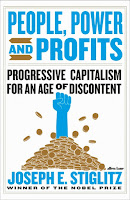22 Quotes from People, Power and Profits by Joseph Stiglitz
Nobel prize winner economist Joseph Stiglitz has written a new book called People, Power and Profits. In this book he describes how, since the mid-1970s has been dominated by a conservative ideology which, step-by-step has brought every increasing inequality and the undermining of democracy. In the book, Stiglitz explains what's wrong and what's needed and how to move forward.
Here are some quotes from the book:
Here are some quotes from the book:
- Reagan's tax cut in 1981 opened up an era of enormous fiscal deficits, slower growth, and greater inequality.
- Reagan kept up at least the facade of reason and logic. There was a theory behind his tax cuts, the supply-side economics [...]. Forty years later, that theory has been disapproved over and over again.
- [...] the only way in a democratic society for the minority- whether it's large corporations trying to exploit consumers, banks trying to exploit borrowers, or those mired in the past trying to recreate a bygone world- to maintain their economic and political dominance is by suppressing democracy, in one way or another.
- Inequality is a choice. It is not inevitable.
- Achieving a fairer society requires equality of opportunity, but that in turn requires greater equality of incomes and wealth.
- American style capitalism is changing our individual and national identities in unfortunate ways. [...] Norms, what we view as acceptable behavior or not, have been changing in ways that undermine social cohesion, trust, and even economic performance.
- The true sources of wealth are the productivity, creativity, and vitality of our people; the advances of science and technology that have been so marked of the past two and a half centuries; and the advances in economic, political, and social organization that have occurred over the same period, including the rule of law, competitive, well-regulated markets, and democratic institutions with checks, balances, and a braid range of "truth-telling" institutions.
- Donald Trump has gone well beyond the traditional "conservative" economic agenda. In some ways, he is in fact revolutionary: he has vigorously attacked the central institutions of our society by which we attempt to acquire knowledge and ascertain the truth. His targets include our universities, the scientific community, and our judiciary. His most vicious attacks, of course, have been on the standard media.
- Rather than adapting his views to make them consonant with reality (say, about climate change), Trump would rather attack those who work to uncover the truth.
- Just as money has contaminated America's politics, it has contaminated beliefs more generally.
- During his presidency, Obama did not, perhaps could not, deal with the issue of inequality, even as he recognized its importance. [...] Matters got worse.
- There is no epidemic that can explain why Americans are dying younger and are less healthy that those in Europe and elsewhere. Rather, the causality goes at least partly the other way: because our economy has failed to produce good jobs, with decent wages, individuals have essentially given up, and this despair leads to social diseases like alcoholism, and drug dependence.
- Too much of the nation's energy was devoted to exploitation, too little to true wealth creation.
- More often than not, firms' incentives are to create market power, not just better products. They've used this market power to exploit their consumers, their workers, and the political system, in ways that have resulted in lower growth, even in a supposedly innovative economy. even worse, the growth benefits only a fraction of the country.
- While globalization, and especially poorly managed trade liberalization, has contributed to deindustrialization, unemployment, and inequality, Donald Trump's protectionist policies won't solve any of these problems. Indeed, his mindless undoing of the global rules based system may make some of them worse. Renegotiating trade agreements will neither reduce the trade deficit nor lead to a return of manufacturing jobs. This is because the trade deficit is determined largely by macroeconomic factors, not by trade agreements. Macroeconomic factors determine the exchange rate and the exchange rate is critical in determining exports and imports.
- When the 2017 tax bill was passed, it enormously increased the government's future deficit and simultaneously increased the amount of capital the US would eventually have to import from abroad to finance it. This last will increase the value of the dollar and thereby the trade deficit.
- It was not inevitable that Germany would go through the nightmare of Hitler, and at many points there were opportunities for the business elite to stand up to him. Will someone a half century from now be writing a similar sentence about America's business community today?
- We led the world in creating a modern democracy and democratic institutions, now we seem to be lagging.
- Most of us, I suspect, want our children to be caring and giving, not selfish and self-serving.
- The revulsion we feel for the conduct of our political and business leaders is a good sign- it means that we are not yet a perfect mirror of the economic system based on self-interest and greed that we have created. If the nation's course is left unchecked, however, we will become increasingly so.
- There are two pillars to the increases in our standards of living over the past 250 years: better understanding of how to organize society (checks and balances, rules of law); and better understanding of nature- the advances in science and technology. We've seen how trump and his team have tried to undermine both.
- Trump has attacked the pillars of our civilization, those that have in fact made us great, and are the basis of the remarkable advances in standards of living.

Comments